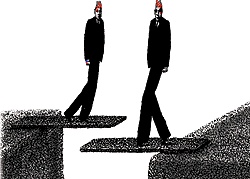 It's time to call a moratorium on this unnecessary and totally futile confrontation between the political parties and the palace. The war of words is now degenerating into a new cycle of street-fighting, chukka-jams and bandhs. Clearly, before setting up the government-Maoist truce Narayan Singh Pun should have been first entrusted with organising a ceasefire between the parties and the king.
It's time to call a moratorium on this unnecessary and totally futile confrontation between the political parties and the palace. The war of words is now degenerating into a new cycle of street-fighting, chukka-jams and bandhs. Clearly, before setting up the government-Maoist truce Narayan Singh Pun should have been first entrusted with organising a ceasefire between the parties and the king. This pointless polarisation is anti-people and anti-peace process. It takes the country back to square one-to 1989 when the underground political parties were on a confrontation course with an absolute monarchy that vacillated till the end and finally caved in to popular unrest. The only difference this time is that the parties, despite paying lip service to the cause, are not fighting for morality, justice and democracy. It's a fear of being left out.
For this, they have no one else to blame but themselves. Our new year opinion poll last week showed that 65 percent of Nepalis faulted the political parties and their leadership for the country's present crisis. Only four percent blamed parliamentary democracy. Something went seriously wrong in the past decade: the leaders failed us and they squandered the political freedom that they themselves gave their lives for. If a disaster of this magnitude cannot bring our political forces together, one wonders what will. A foreign invasion?
At the root of the present crisis of confidence between the king and the politicos is a deep-seated distrust of each other. What unites the otherwise-fractious leaders of the political parties is the suspicion that King Gyanendra is an autocrat at heart, he wants to be an absolute ruler, and he is up to his father's old tricks of divide-and-rule. Nothing the king says can convince them otherwise. So now they get their student wings to pump up the volume and get out on the streets to burn government vehicles and vandalise traffic lights.
King Gyanendra, on the other hand, seems convinced that it must be peace first, democracy second. If power is handed back to these greedy and near-sighted leaders, they are just going to take the country down with them. He fears it will be a return to inept governance, corruption, nepotism, and ministers running state institutions to the ground by using them as employment agencies.
To be sure, we feel the king could do more to allay the parties\' suspicions about his true intentions. He may be making the right noises about constitutional monarchy and parliamentary democracy, but his actions and royal demeanour do not always reflect this. On the other hand, every utterance that GP Koirala makes these days convinces us that he is a loose canon who still doesn't get it.
The political parties, more than any one else, should know that by taking to the streets the only people who will suffer are those dependent on daily wages. The democracy slogans from the past decade suddenly sound hollow, the people know it is all about grabbing a share of the power before the next elections.
For Nepal's foreign investment, exports and tourism, all this couldn\'t have come at a worse time. The Iraq war is winding down and the SARS epidemic may have peaked, but political instability at home is going to kill the slim chances of recovery that were emerging. Television footage of burning buses and stone-strewn streets are going to turn back the few visitors who may be mustering the courage to come to Nepal.
And the newly-surfaced Maoists suddenly quiet. Why say anything when they can just sit back and enjoy watching the ruling class self-destruct. Time out.


